It’s not hard to find a rug made with natural materials. But not all rugs are as eco-friendly and non-toxic as they first seem. Here are my top picks for beautiful, sustainable, non-toxic rugs made in a socially responsible way.
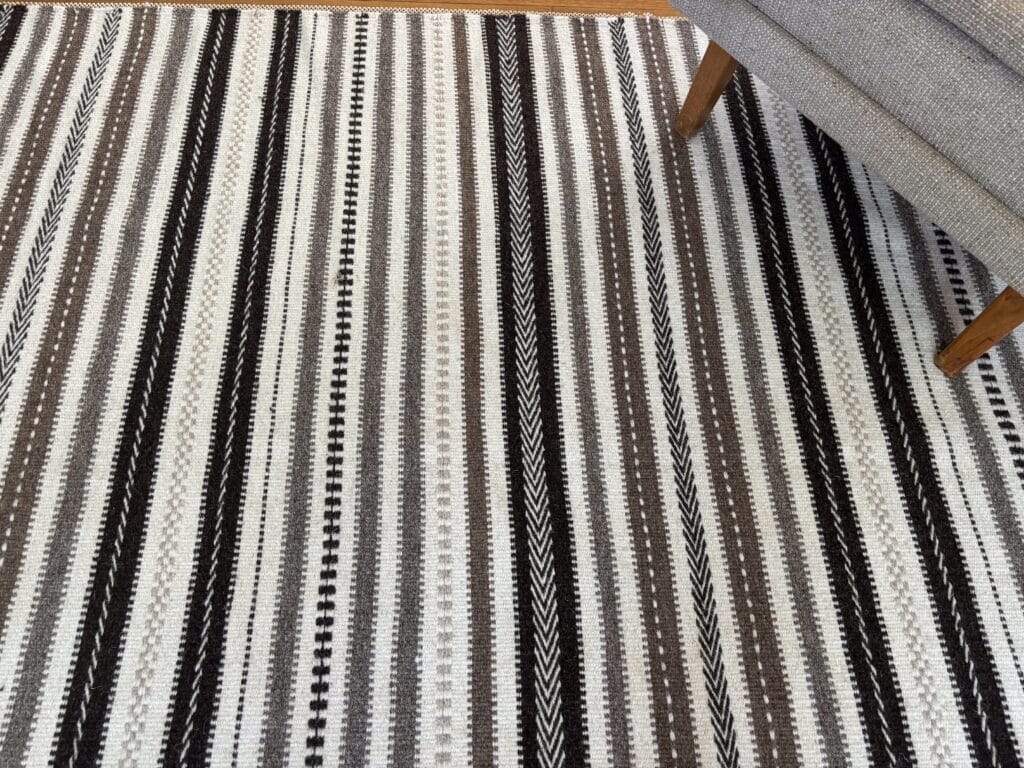
I’ve bought (and made!) a few rugs in my time, so I have a good sense of what to look for and what to avoid. My favorite natural rug materials by far are:
- Jute – hardwearing
- Organic or recycled cotton – soft and washable
- Wool – naturally resistant to water and stains, and very insulating.
Each has its place, so be sure to think about foot traffic and other factors when choosing a new rug.

Questions to ask before buying a new rug
If you’re in the market for a new eco-friendly rug, and want to make a healthy choice, consider the following questions:
- What materials are used in making the rug?
- Are these materials recycled and/or recyclable, organic, natural, and fairly sourced?
- Are the materials or the final product treated with toxic chemicals, such as azo dyes?
- Does the manufacturing of the rug harm humans, other animals, and/or the environment?
- Does the rug have green certifications?
Our top picks
- Sustainable, natural, recycled, non-toxic materials
- Colorful rug options
- Wide variety of sizes, pile heights, and patterns
- No stain repellents, fire retardants or other toxic chemicals
- Relatively affordable!
- Sustainable, minimalist packaging
- Some rugs are made with wool that doesn’t carry GOTS certification
- Rug pad is flimsy and rugs tend to slide rather than stay in place
Hook and Loom is based in Massachusetts and makes rugs in carefully selected workshops in India, free from child labor. Most rugs are handwoven on wooden looms and come in a variety of colors, patterns, pile heights, and sizes.
The company doesn’t use stain repellents, fire retardants, or other toxic chemicals and ships its rugs with minimal, sustainable packaging.
Unlike other companies that use ‘recycled’ cotton that is actually just new cotton rejected for poor quality, Hook and Loom amasses discarded textiles and recovers the fibers, separating these into spools of colored yarn. These fibers are then woven by hand to create new rugs without having to add dyes or chemicals. And unlike newly dyed rugs, these don’t fade, bleed, or shrink when you wash them!
Because of the nature of recycled textiles, Hook and Loom eco cotton rugs typically comprise 85% cotton, 12% polyester, and 3% other materials.
The latest GOTS certified Hook and Loom collection is made with certified organic cotton and nothing else. That means they are free from toxic chemicals, wool, and latex. These rugs aren’t as colorful as the eco cotton collection as they are made with pure, dye-free organic cotton!

Hook and Loom also makes wool rugs. We love these too, especially because they’re undyed and reversible. However, the wool doesn’t carry GOTS certification, so it loses a leaf from us. Check out my review of Hook and Loom’s wool rugs or the full review at the link below.
- Sustainable, natural, non-toxic materials
- Good variety of sizes, pile heights, and patterns
- No stain repellents, fire retardants or other toxic chemicals
- One of few rug companies with Goodweave certification for social fairness
- FSC certified latex for hand-tufting
- Can be expensive
- Limited color options
- Non-refundable for most rugs
Organic Weave is based in Montreal, Canada, and was founded by Linda Alexanian after a trip to India in 1989 where she saw widespread child labor in the rug supply chain. Alexanian set out to change the rug industry and founded Organic Weave to produce what appears to be the first GOTS certified organic rugs.
Organic Weave is GoodWeave certified and partners with women in rural India to provide dignified work and sustainable income while guaranteeing no child labor.
Organic Weave is one of very few companies making truly eco-friendly and sustainable rugs while also committing to social fairness.
These beautiful rugs are GOTS certified, vibrant, safe, sustainable, and attractive. Rugs are typically custom made and non-refundable, however, with prices ranging from around $300 to more than $10,000.
The company uses FSC (Forest Stewardship Council) certified natural rubber glue (or latex) in the manufacture of hand-tufted rugs. The latex secures (glues) the pile of the rug to the backing (organic cotton canvas).
If you’re looking for a real masterpiece, Organic Weave offers custom made rugs too. The company used to make ornate silk rugs but no longer offers these, which is a plus because we usually don’t recommend silk as a sustainable material.
Free eBook: Simple Steps to a Greener Home
Concerned about climate change? Learn actionable tips for making each room in your home greener.
"*" indicates required fields
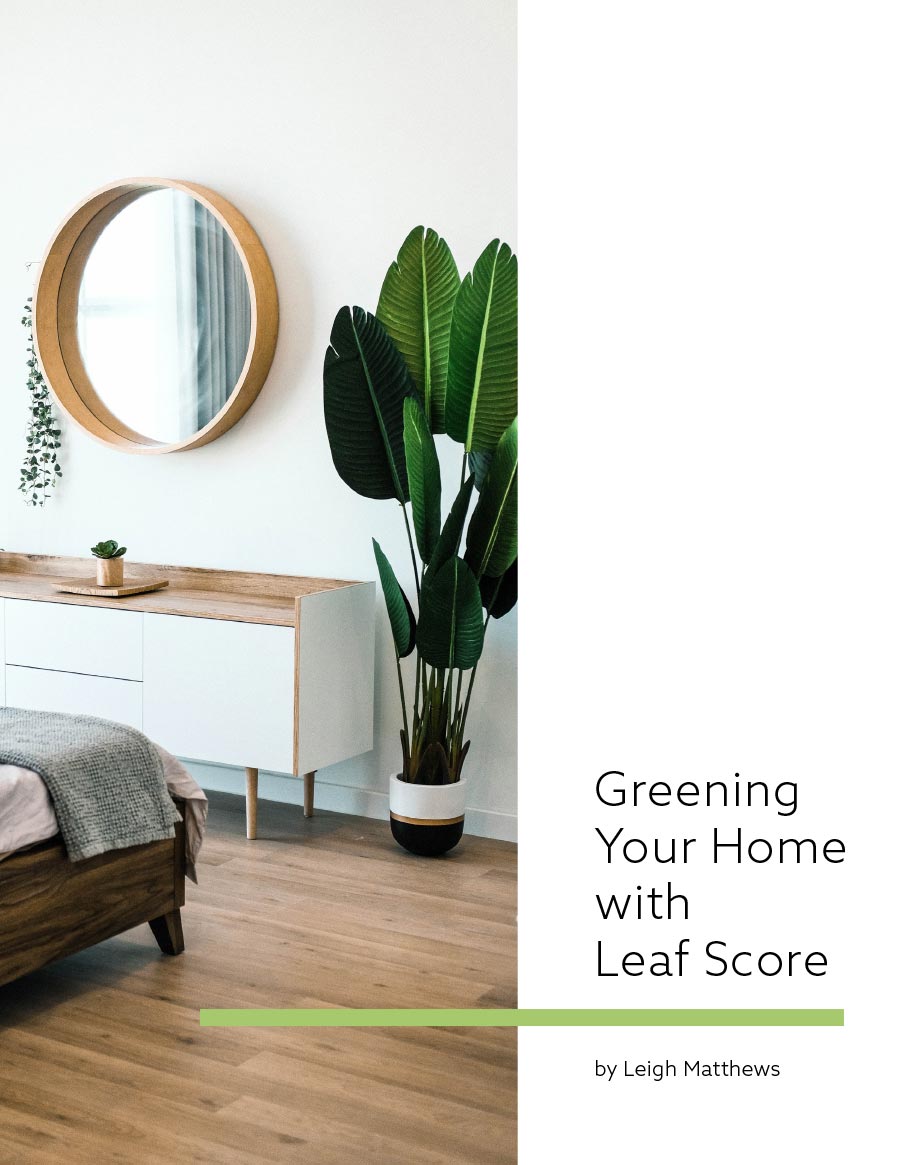
- Sustainable, natural, non-toxic, biodegradable materials
- No synthetic materials or chemicals
- Some collections made in the U.S.
- Collections include naturally dyed wool rugs
- Can be expensive
- Limited color options and patterns
Earth Weave is a big name in eco-friendly carpeting. The company was the first to make fully biodegradable carpets using only natural materials such as hemp and natural latex.

Happily, Earth Weave went on to launch its Bio-Floor carpet range in a rug style. These rugs are made in the US and do not include any:
- Synthetic fibers
- Synthetic backing
- Synthetic adhesives.
Instead, Earth Weave makes its Bio-Floor rugs with naturally pigmented undyed wool fibers. Earth Weave also offers an OrganoSoftColor™ range comprising wool rugs dyed with safe ingredients.
Earth Weave rugs are all natural, non-toxic, and do not off-gas harmful chemicals.
- Handmade organic cotton, wool, and hemp rugs
- Made in Europe using organic European hemp
- Low-impact natural dyes and no hazardous chemicals
- Plastic-free, sustainable packaging
- Some smaller rugs are machine washable (though best to air, beat, and spot-clean only)
- Limited sizes and colors
- Only two styles
Rawganique is one of our favorite eco-friendly companies for clothing, bedding, pet beds and more. Surprisingly, the company only offers two styles of rug, soon to be one:
- Organic Hemp and Wool
- Organic Cotton and Hemp.
The latter will soon be discontinued, so if you like the look of it, get it fast.
The good news is that both rugs are free of any hazardous chemicals, synthetic fibers, or even conventional resource-hungry fibers. Instead, they’re made with organic European hemp, wool, and organic cotton. These are hardwearing, sustainable, and soft.
As with all Rawganique products, the company ships its rugs without plastic unless you explicitly request such packaging. Its rugs may ship with lavender sachets, however, so be sure to ask for those to be left out if you dislike lavender.
- Handmade organic cotton rugs
- Made using scrap GOTS organic cotton from the company’s clothing line
- Made in a certified Fair Trade factory in Egypt
- 100% organic Egyptian long-staple cotton
- Low-impact dyes and no bleach
- Company engages in charitable, social causes
- Only two sizes
- Limited patterns
- Only one colorway (natural, undyed)
Under the Nile looms its big and small rugs by hand using leftover scraps from the company’s clothing production. These rugs are an excellent option for every room of the house as they are soft, washable, and durable.
The rugs are GOTS certified and made in a Certified Fair Trade facility in Egypt that adheres to the highest global textile and labor standards.
Under the Nile was founded by a woman looking for non-toxic, safe, and sustainable baby clothing options. The rugs are a continuation of that ethos, helping not only to reduce manufacturing waste but to provide an eco-friendly play mat option for nurseries and children’s rooms.
These rugs are made of 100% organic Egyptian cotton with a long staple, making it very durable. The company uses only low-impact, metal free dyes when dying yarn and never uses bleach. To provide color continuity across products, Under the Nile uses an oxygen-based whitening process.
Under the Nile organic supports various social and charitable causes promoting child welfare, environmental responsibility, and gender equality.
- Handmade GOTS organic cotton rugs
- Made in Ohio, Georgia
- Free of hazardous chemicals and synthetic materials
- Available in a variety of sizes
- Can machine wash and dry!
- Fabric swatches available
- Larger rugs are handmade to order, with a 3-week wait time
- Best used with a rug pad underneath
Willaby is a great choice for 100% GOTS organic cotton rugs. This Ohio, Georgia, business makes its rugs using handweaving and treadle sewing machines at an Amish family workshop.
All of the rugs are free from:
- Azo dyes
- Flame retardants
- Formaldehyde
- Other concerning chemicals.
These super-soft rugs come in a variety of sizes, ranging from small rugs perfect for bath, baby play mat, or doormat, to area rugs and runners.
The rugs are machine washable and can be dried on a low heat. They measure about 3/8th of an inch thick and you’ll likely want to use a rug pad underneath to keep the rug in place.
Willaby offers fabric swatches to help you figure out the right color.
Don’t expect a quick turnaround for larger area rugs. The smaller rugs ship right away, but the larger handmade rugs take up to three weeks to make and ship.
Willaby is a great example of the confusion of organic certification. It wasn’t clear from the product information if the rugs were entirely GOTS certified or carry GOLS certification for the latex.
I asked Willaby for its GOTS certification and clarity on GOLS.
It turns out that Willaby purchased a large amount of GOTS cotton with a valid certification at the supplier, several years ago. Willaby has been using this cotton, without adulteration or additives, to make its rugs. So, while they aren’t technically GOTS certified as a product, they do meet the GOTS standard.
A company spokesperson told me that Willaby will launch a new collection in 2024 made with GOTS certified cotton from a new supplier. This will allow the company to be more transparent about its materials sourcing.
As for GOLS certification, this is also held by the supplier of the latex, not Willaby itself.
- Some natural jute, wool, and hemp rugs
- Some organic and recycled cotton options
- Available in a variety of sizes
- Fair Trade Certified rugs available
- Hard to tell which rugs are genuinely eco-friendly
- Can be expensive
- Packaging isn’t plastic-free or sustainable
In 2014, West Elm became the first home retailer to join Fair Trade USA™. These days, West Elm continues to offer a range of Fair Trade Certified™ products including rugs, bedding and furniture.

Most West Elm rugs continue to lack legitimate eco-credentials, however. That means you’ll want to check listings carefully. A good place to start is to look for rugs made with jute, wool, and hemp. Some rugs have certified recycled cotton backings, while others have synthetic backings.
Check out my review for the West Elm Jute Boucle Rug here and the West Elm Mini Pebble Wool Jute Rug.
- Rugs made with jute, sisal, seagrass and other natural fibers
- Some recycled cotton and other recycled fiber options
- Available in a variety of sizes, patterns, and styles
- Fast delivery – 3,000 designs in stock and ready to ship!
- Hard to tell which rugs are genuinely eco-friendly
- Some rugs are very heavy
- Rugs may need beating and vacuuming regularly at least at first
- Can be expensive
- Packaging isn’t plastic-free or sustainable
- Some rugs still contain harmful chemicals
Safavieh was founded in 1914 as a family company committed to working with artisans to provide handmade rugs to consumers worldwide. This company has grown considerably in the last few decades and now works with top designers and celebrities to produce unique collections.
Safavieh also sells its more affordable, sustainable, eco-friendly rugs handmade using recycled and natural materials.
Safavieh tries harder than most rug companies to source its materials sustainably, including sourcing:
- Legally harvested forest products
- Responsibly produced plantation products
- Recycled content.
It’s also a member of the Sustainable Furnishings Council and encourages its suppliers to replace any remaining toxic, synthetic, or conventional materials and chemicals with ones that aren’t harmful to people or planet.
While Safavieh isn’t Goodweave certified, it pays living wages (not just minimum wage) and is taking steps to:
- Reduce energy consumption
- Offset carbon emissions
- Use a greater proportion of certified renewable energy.
Safavieh is also a member of the ORIA (The Oriental Rug Importers Association), an organization that supports the needs of children and their families in major carpet weaving districts around the world.
Unfortunately, not all Safavieh products are made to the same eco-friendly standards, so check listings carefully and ask questions where necessary. The Safavieh jute, seagrass, and sisal rugs are generally good options that are sustainable, non-toxic, and eco-friendly.
Check out my reviews of Safavieh’s Cape Cod and Natural Fiber rug collections.
I bought a jute rug from Safavieh in 2018 and love it (as does my dog!). It’s held up incredibly well and looks fantastic. After five years, there’s no sign of wear and tear and it has helped tie the room together in several rooms and two houses.
My Safavieh rug currently graces my office floor, where it adds some much-needed hygge and insulation. The main downsides are that office chair wheels don’t roll on this chunky ridged rug and it needs a pretty high power vacuum for a good clean. For smaller rugs, you could hang them outside and beat them; for larger rugs, they’re way too heavy for this.
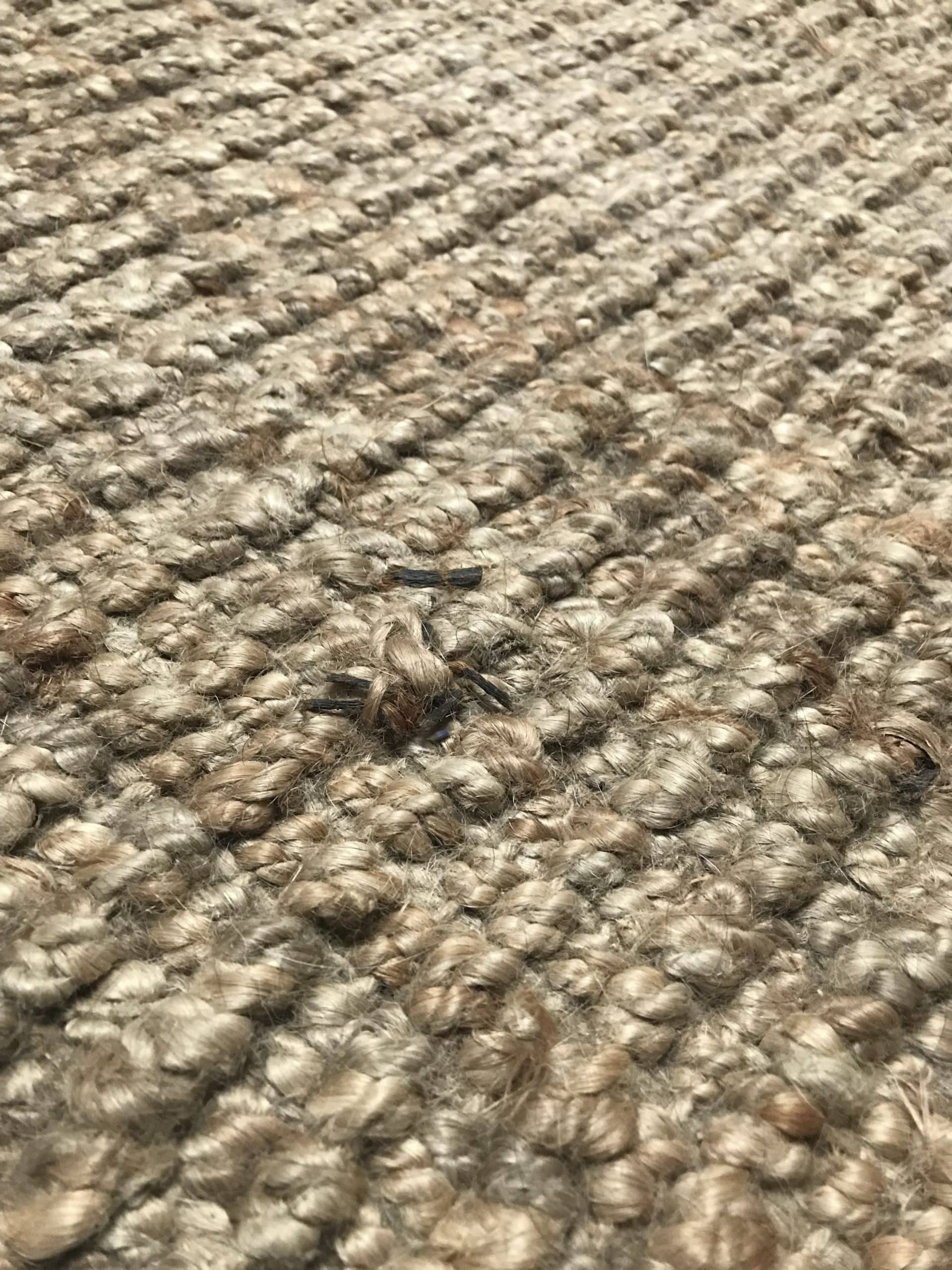
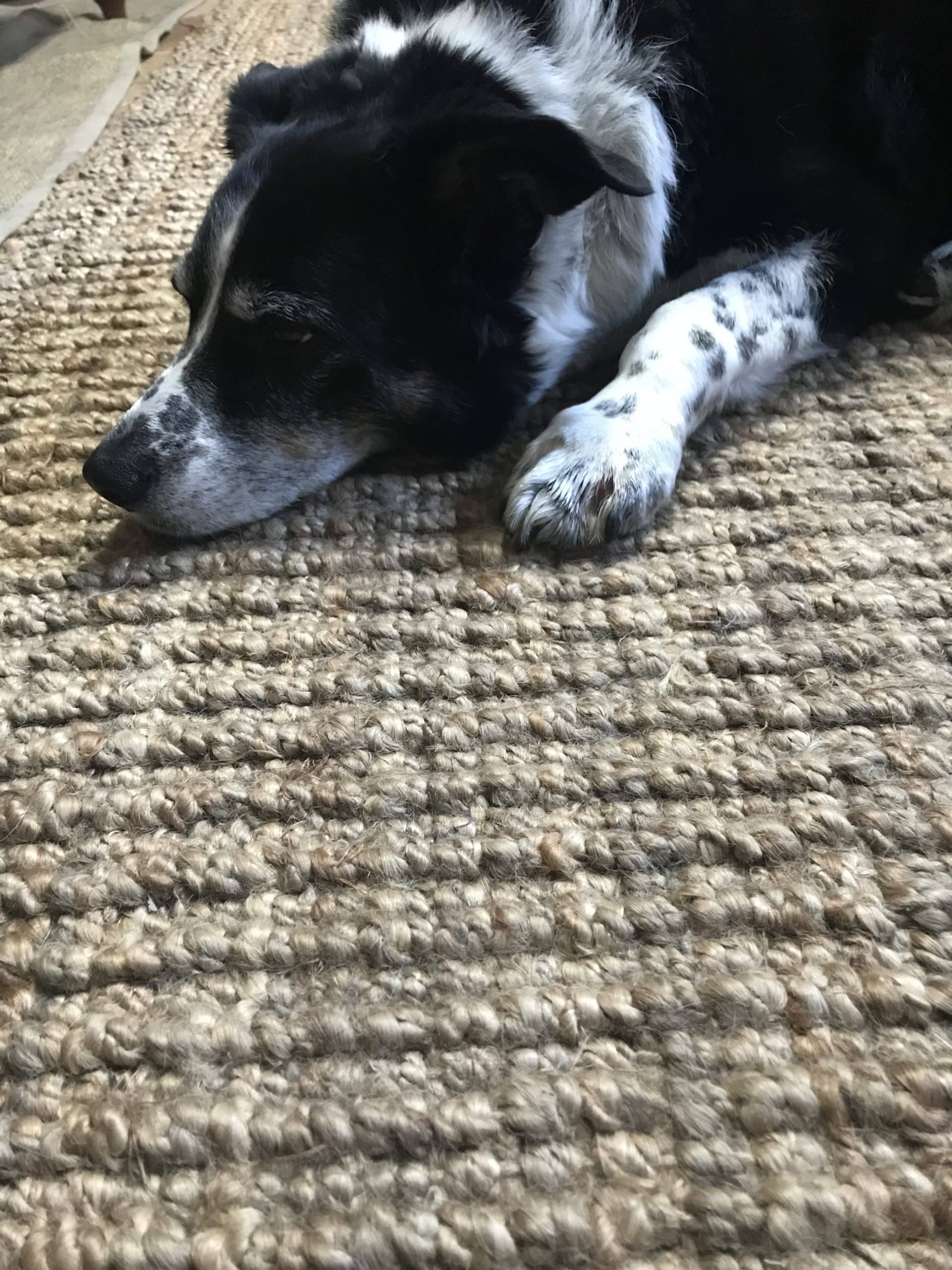
- Rugs made with some natural, recycled synthetic, and virgin synthetic materials
- Available in a variety of sizes, patterns, and styles
- Affordable
- Outdoor recycled plastic rugs available
- Company is trying to up its eco-game
- Partners with TerraPass for recycling initiatives
- Hard to tell which rugs are genuinely eco-friendly
- Packaging isn’t plastic-free or sustainable
- Some rugs still contain harmful chemicals
VivaTerra has been around since 2004 and offers contemporary and traditional eco-friendly home décor products. Some products are more sustainable than others, though, so check rug listings carefully.
VivaTerra claims to favor fair-trade partners and sustainable methods of production, but most products do not carry specific third-party certifications. This makes it a challenge to figure out if products are being greenwashed.
The good news is that VivaTerra has partnered with TerraPass, an organization that supports businesses in taking responsibility for climate impacts and offsetting carbon footprints.
Check out my review of VivaTerra’s Starburst Seagrass Rush Rugs here.
Many of the rugs above do best with a rug pad underneath to help stop them slipping. Rug pads also add extra cushioning and can extend the life of a rug.
Parachute Home offers one of the best rug pads around, made with natural rubber and organic jute. Check it out on Parachute Home.
Synthetic rugs are problematic for the planet
Synthetic and conventional rugs can have serious adverse effects not just on our health but also on the planet and global warming.
The energy footprint, water use, and environmental pollution attributable to conventional synthetic or cotton rugs is staggering. What’s more, many of these items simply end up in landfill when styles change, where they off-gas, leach chemicals, and can take decades or longer to degrade.
Natural fibers grown organically and/or sustainably, that haven’t been treated with toxic chemicals, are better for people and the planet.
Rugs are more eco-friendly than carpeting because:
- Fewer resources go into making them
- It’s much easier to repurpose or recycle a rug
- Most natural rugs break down faster than carpet
- They’re lighter and smaller to ship!
There are usually more natural, non-toxic options available for rugs versus carpets. This means when a rug comes to end of life, it will usually break down without leaching toxins into the air, water, or soil.
Rugs and indoor air quality
VOCs (volatile organic compounds) are emitted as a breathable gas from rugs, carpets, and other common household furnishings and products. So much so that, according to the EPA, concentrations of VOCs inside a house can be ten-fold higher than outdoors.
Check out our picks for the best indoor air quality monitors and find out how your home’s doing.
VOCs are commonly found in rugs because these textiles are treated with:
- Stain and water repellents
- Antimicrobial treatments (in bath rugs, for instance)
- Anti-static treatments
- Adhesives
- Artificial dyes
- Flame retardants.
In general, if a rug is marketed as stain resistant, avoid it. It has probably been treated with toxic chemicals or is made with synthetic, closed fiber materials that cause environmental pollution and health problems of their own.
Final thoughts on the best natural, non-toxic, rugs
My top picks for eco-friendly, non-toxic rugs are Hook & Loom, Organic Weave, and Earth Weave. Sure, you can get natural rugs elsewhere, but these are the folks who know the rug business and are working hard to make good quality rugs while pushing the industry as a whole to do better.
Once upon a time we also included Coyuchi as a top pick for rugs. These days, it seems the company only offers bath rugs (AKA bath mats). That said, you can still find some Coyuchi rugs for sale at MadeTrade. Fortunately, Coyuchi still offers fantastic duvets, bed sheets, and other home products made with natural, organic materials.
As always, if there’s a company or rug you think deserves my attention, get in touch and I’ll check it out.
Rugs from Hook & Loom:
Rugs from Organic Weave:
Earth Weave rug reviews:
- Earth Weave Catskill Collection Rugs
- Earth Weave Dolomite Collection Area Rugs
- Earth Weave Pyrenees Collection Area Rugs
- Earth Weave McKinley Collection Area Rugs
From West Elm:
From Safavieh:
- Safavieh Natural Fiber Collection Jute Area Rug [Staff tested]
- Safavieh Cape Cod Collection Jute Area Rug
Other top choices for more sustainable rugs:
Free eBook: Simple Steps to a Greener Home
Concerned about climate change? Learn actionable tips for making each room in your home greener.
"*" indicates required fields

Organic rugs FAQ
If you have kids, cats, dogs, or other mess-prone family members, stain-resistant rugs might seem like a must. The bad news, though, is that manufacturers use some pretty hazardous chemicals to make rugs resistant to stains.
Worse, kids and pets tend to spend more time in close contact with rugs, increasing their exposure to chemicals. Babies and younger children are especially at risk of harm from certain chemicals as early life exposure can permanently affect their developing brains and bodies.
Stain resistant rugs have typically been treated with perfluorinated chemicals (PFCs). These are
associated with a number of health issues, which is why we left stain resistant rugs off our list.
Synthetic rugs are almost always treated with toxic flame retardant chemicals. Rugs made with nylon and polypropylene are especially flammable as they’re petroleum products. For a good primer on the potential problems with human exposure to flame retardants, see this excellent write up from the National Institute of Environmental Health Sciences.
In contrast, wool is naturally flame retardant, meaning there’s no need to douse it with flame retardant chemicals.
Wayfair offers ‘natural’ and ‘eco-friendly’ rugs with less robust or non-existent eco credentials. Some are, indeed, made with recycled and seemingly eco-friendly materials such as recycled cotton, jute, hemp, and other fibers.
Be cautious, however, when looking through these listings and ask questions if details are lacking for a specific item. Oftentimes, these rugs are made with conventional cotton, synthetic fiber blends with a cotton trim, or are totally synthetic and greenwashed.
Not always! Wool is naturally resistant to flame and quite resistant to staining. This is good news is that manufacturers don’t need to treat wool with chemical flame retardants or stain repellants.
The bad news is that because wool resists stains, many manufacturers use harsh chemicals to strip the wool’s natural oils, so that it can better absorb dyes. This, in essence, turns a natural, non-toxic fiber into a potentially harmful material.
Check for GOTS certifications for wool rugs.
Companies such as Earth Weave have created their own ways to color wool without relying on problematic chemicals. This is one reason why I recommend Earth Weave so highly, both for rugs and carpet. See my reviews of the Earth Weave Dolomite Collection, the Earth Weave Pyrenees Collection, and the Earth Weave McKinley Collection.




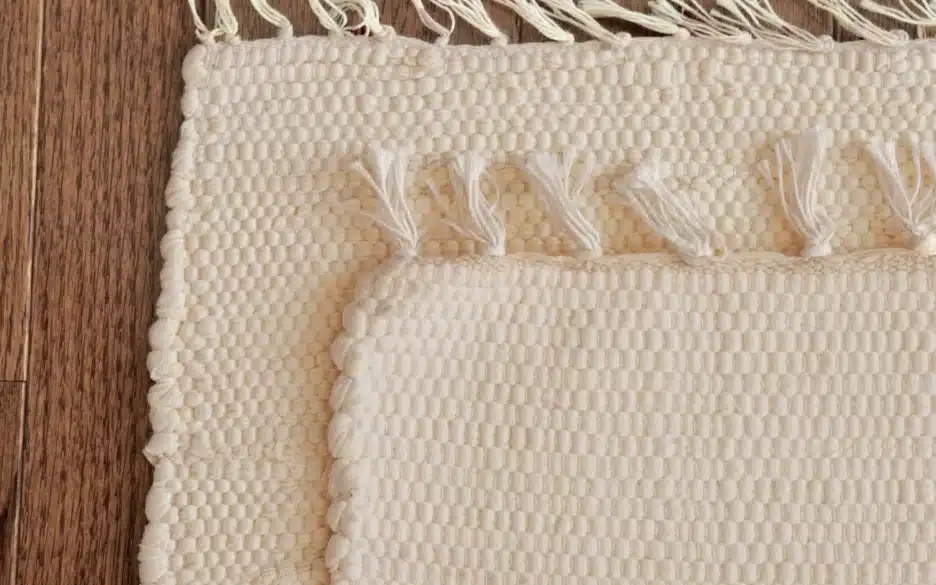
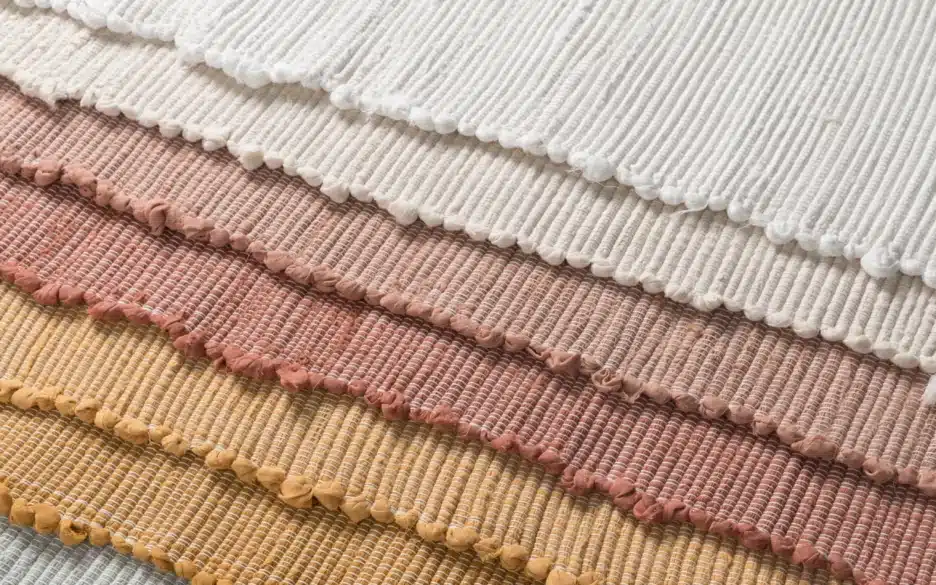



Were you able to receive GOTS certifications from Willaby? I reached out to them and they blacked out most info they provided and I don’t see them on the GOTS site.
Hi Liz,
Thanks for the question and for your own efforts checking into sustainability credentials!
Willaby did send me the GOTS certificate for the cotton and explained their (all too common) situation. I’ve included this in the post now for everyone to see.
The gist of it, though, is that Willaby bought a lot of GOTS certified organic cotton a few years ago from a supplier with a valid certification at the time. That certification has now expired, which is why the number won’t show up in the GOTS database even if we had it.
The certificate is also held by the supplier, rather than Willaby itself. Again, that’s why you won’t find Willaby itself listed in the GOTS database. And because the company had some issues with competitors taking suppliers, it’s understandably wary of providing precise details of that supplier.
The good news is that Willaby will be switching to a new GOTS cotton provider in 2024, and launching a new collection made with this cotton. The hope is that the company will be able to be more transparent about certification then.
This is a common issue for smaller sustainable companies, so I have a lot of sympathy for Willaby. My advice: if you like the current rugs, snap one up before the end of the year!
Leigh
We purchased a large eco cotton rug from hook and loom based off of reviews by you and others. By far the worst rug I’ve ever purchased. It may be non toxic and sustainable, but it is an awful material for a rug. Pills within the first week and creates stains with only water. There is no way to keep it looking nice. They made me jump through hoops to get any sort of payment back for it as well. Now I have a 9×12 rug that will not come clean and no one will want so I will have to dispose of it. Recycling a rug of that size is almost impossible.
Is there any rug you recommend that has a good leaf score, can handle simple spills and is comfortable? Jute and wool seem to shed so much.
Rachael, thank you for the feedback. We have received positive Hook & Loom feedback to this point, but your experience will trigger a review of these rankings and likely an update.